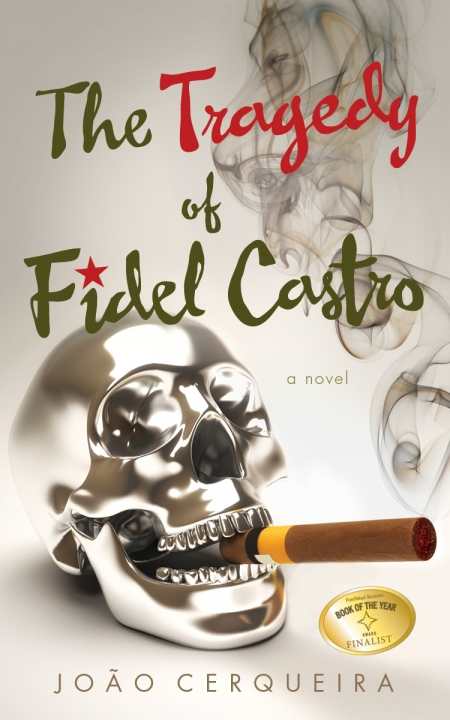The Tragedy of Fidel Castro
- 2012 INDIES Winner
- Bronze, Translations (Adult Fiction)
This memorable satire features fictional versions of JFK, Fidel, God, and Jesus maneuvering to influence events.
Exuberant in its depiction of a communist country threatened by capitalism, and of an American president who “understood that his nation was no more than a splinter of an infinite universe” vulnerable to revolutionary ideas, Portuguese author João Cerqueira’s seventh book revels in extremes.
Borrowing elements of magical realism and dark humor, the swiftly changing plot tests credulity from the start. With a prologue that foreshadows the careful twining of religion, politics, questions of divine intervention and human folly, readers are tipped to the strangeness to come when Fátima phones God to warn him of an impending war between Cuba and the United States. The author plays fast and loose with history to hammer home the absurdity of powerful men vying for control, resulting in a dizzying display of hyperbolic imagination.
Through scenes that include Fidel dancing with a spy while disguised as a woman; an encounter with a Yoruban deity during a Santería ceremony; a political fight dissolving into a mud wrestling match between a priest and a prostitute; Fidel being mistaken for a lunatic; and other colorful examples, a hallucinatory world reveals stark polarities layer by layer. Issues of poverty and wealth, government and the masses, come to a head over situations ranging from the prospect of opening Cuba to tourism to an aerial invasion by Fidel’s army.
Cerqueira, whose novel is billed as alternative history, provides a fresher perspective on intriguing figures. JFK emerges not only as a charismatic orator and capable president, but as a man with relatable worries and concerns; Fidel becomes a more complex personage than expected; and Jesus, in his second coming, is whimsically rendered as a man poised between a perplexing modernity and the past.
A few moments—including an extended passage written by the fictional Fidel, and an attempted uprising at a monastery—may strike some readers as indulgent digressions. Still, as characters race to blame the other country’s ideologies for domestic problems, trenchant views on war subtly wind through the text. The surprising conclusion is fitting in its drama, deftly blurring the line between tragedy and macabre comedy. This book is best suited for aficionados of unconventional, concept-driven fiction with a particular flair for well-timed zingers as well as memorable dialogue.
Reviewed by
Karen Rigby
Disclosure: This article is not an endorsement, but a review. The publisher of this book provided free copies of the book and paid a small fee to have their book reviewed by a professional reviewer. Foreword Reviews and Clarion Reviews make no guarantee that the publisher will receive a positive review. Foreword Magazine, Inc. is disclosing this in accordance with the Federal Trade Commission’s 16 CFR, Part 255.

